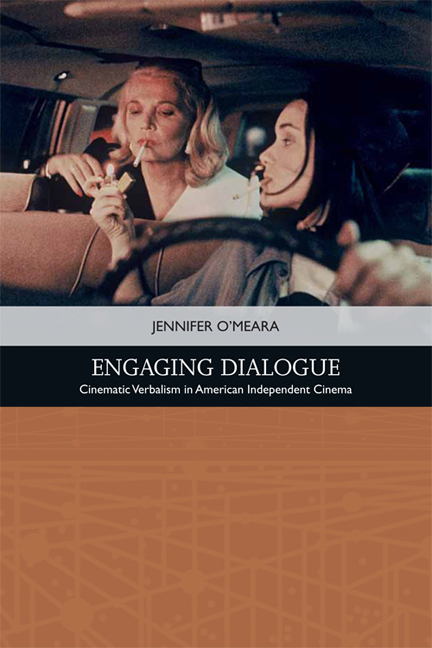Book contents
- Frontmatter
- Contents
- List of Figures
- Acknowledgements
- Introduction
- 1 Measuring Engaging Dialogue
- 2 Verbal-Visual Style and Words Visualised
- 3 The Integrated Soundtrack and Lyrical Speech
- 4 Dialogue and Character Construction
- 5 Embodying Dialogue: Rich Voices, Expressive Mouths and Gesticulation
- 6 Gendered Verbal Dynamics: Sensitive Men and Explicit Women
- 7 Adapting Dialogue and Authorial Double-voicing
- Conclusion: Verbal Extremes and Excess
- Filmography
- Bibliography
- Index
7 - Adapting Dialogue and Authorial Double-voicing
Published online by Cambridge University Press: 01 May 2021
- Frontmatter
- Contents
- List of Figures
- Acknowledgements
- Introduction
- 1 Measuring Engaging Dialogue
- 2 Verbal-Visual Style and Words Visualised
- 3 The Integrated Soundtrack and Lyrical Speech
- 4 Dialogue and Character Construction
- 5 Embodying Dialogue: Rich Voices, Expressive Mouths and Gesticulation
- 6 Gendered Verbal Dynamics: Sensitive Men and Explicit Women
- 7 Adapting Dialogue and Authorial Double-voicing
- Conclusion: Verbal Extremes and Excess
- Filmography
- Bibliography
- Index
Summary
Dialogue's association with the literary arts is a key reason why it has been historically undervalued within film studies. It is perhaps no surprise, then, that Literature/Film Quarterly was the journal willing to highlight film dialogue more generally in the 1980s, when it published Jack Shadoian's (1981) ‘Writing for the Screen … Some thoughts on Dialogue’, and John Fawell's ‘The Musicality of the Filmscript’ (1989) – as explored in Chapter 3 when considering dialogue's relationship to the soundtrack. Given the general lack of attention paid to dialogue at this time, these articles were significant. But although adaptation scholars have demonstrated particular interest in voiceovers, as part of a broader interest in the transcodification of narration techniques across media, the discipline has tended to downplay the significance of dialogue more broadly. As Linda Hutcheon explains in her influential book, A Theory of Adaptation (2013 [2006]: 40–1), when theorists discuss shifts from text to performance media ‘the emphasis is usually on the visual, on the move from imagination to actual ocular perception’. By focusing on the verbal elements of the cinematic verbalists’ adaptations, as well as other literary influences on this independent cinema, this final chapter begins to address the imbalance that Hutcheon identifies.
One of the overriding arguments in this book is that, if well-performed and carefully integrated, dialogue can be cinematic. Because although the cinematic verbalists have strong literary influences, they channel these into their dialogue in complex and medium-specific ways. Each of the six filmmakers studied literature at university, or initially pursued a literary career or literary side projects. Their love of words was apparent from their selective adaptation of literary works, in addition to their more general crafting of dialogue. Linklater's A Scanner Darkly (based on the Philip K. Dick (1977) sci-fi novel of the same name) and Anderson's Fantastic Mr. Fox (co-written by Baumbach) based on the Roald Dahl (1988 [1970]) children's book are both relatively direct adaptations, but both films’ verbal styles are notably inflected with independent cinema's broader approach to scripting. Stillman's work provides more complex examples of intertextuality – including his novelisation of The Last Days of Disco and the influence of the work of Jane Austen on Metropolitan and, more recently, Love & Friendship – and we will pay particular attention to his films.
- Type
- Chapter
- Information
- Engaging DialogueCinematic Verbalism in American Independent Cinema, pp. 159 - 175Publisher: Edinburgh University PressPrint publication year: 2018



